Small Businesses Become Resilience Hubs in Eastside Detroit Communities
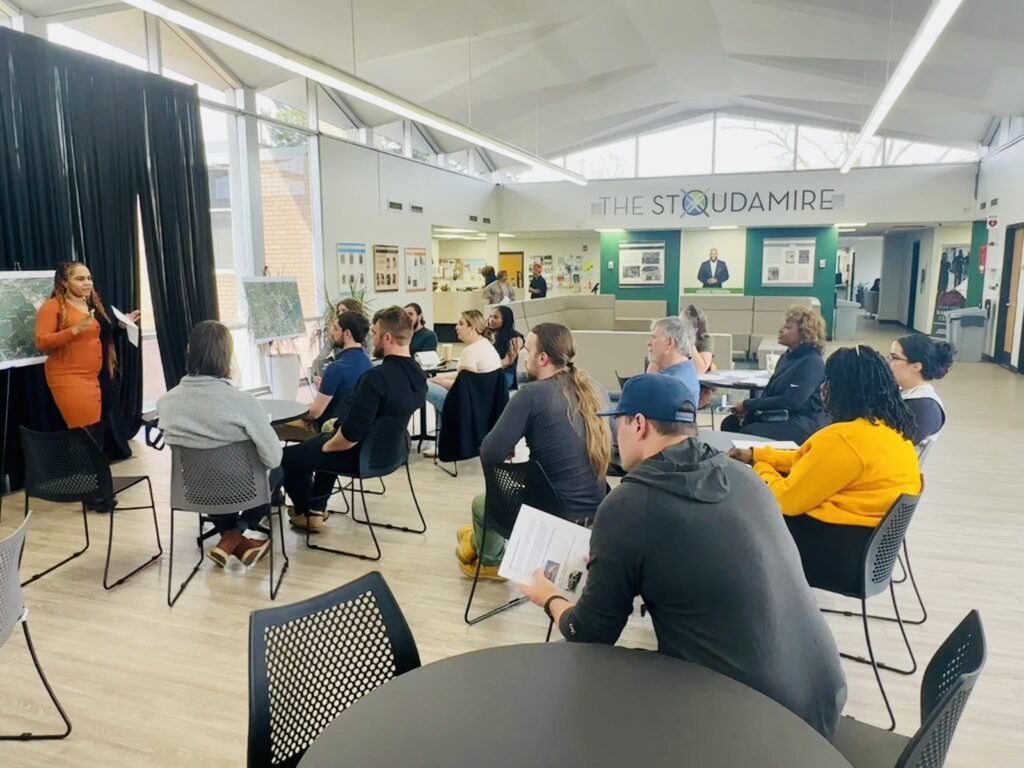
Elevate is a 24-year-old 501(c)(3) nonprofit focused on creating equitable and sustainable communities. Their areas of focus span energy efficiency, water, workforce development, and creating healthy and efficient homes and buildings in communities. Part of the work it is doing in Detroit is helping to develop resilience hubs in response to flooding and ongoing climate-related injustice issues. This is part of the Resilient Eastside Initiative (REI), a culmination of residents and organizations including the Eastside Community Network (ECN), The City of Detroit Office of Sustainability, and the Eastside Climate Action Coalition. Tim Skrotzki, associate director of partnerships at Elevate, and Terri O’Neal, project manager of community programs, talked with SBN Detroit about this work and the role businesses are playing. Q: What is the impetus behind Elevate? A: Elevate is a Chicago-based nonprofit formed in 2000 as an energy cooperative focused on energy efficiency and reducing the drag on the grid. We have projects that touch almost all states. Over the past twenty-four years, our work has expanded to include water, solar, electrification, environmental health, and workforce development. Q: How is Elevate supporting resilient and sustainable communities throughout Detroit and Southeast Michigan? A: One important initiative is the development of Resilience Hubs on Detroit’s East Side. Resilience hubs are vital community centers offering education, support, and resources while fostering community connections. These hubs – many of which are small businesses in the neighborhoods – serve as trusted spaces in touch with residents’ needs. They help facilitate coordination of resources and services across various stakeholders before, during, and after climate-related emergencies. These are being led by the Eastside Community Network and the Resilient Eastside Initiative (REI), a network of 12 resilience hubs on Detroit’s east side, which officially launched in August 2023 in partnership with The City of Detroit Office of Sustainability with funding from the Kresge Foundation. One of these spaces is The Commons, a café, laundromat, and community space that operates in MACC Development’s storefront space on Mack Avenue. This is a safe space for the community that offers charging stations, resources, and more for neighbors during power outages or emergencies. They are also training and upskilling local residents as a form of workforce development. Neighborhood Grocery is another hub, offering healthy food access, refrigerators, and charging stations to neighbors during power outages. This is a framework a lot of businesses can adopt to provide more resources for their communities. It’s an opportunity for businesses to think about where they fit into the community and how they can help the neighborhood remain resilient and sustainable. Further, part of the funding we received from Kresge is being used for training black contractors in solar and EV infrastructure. Called the Detroit Clean Energy Contractor Accelerator Program, the program helps create growth paths and lift up black and brown contractors to help them build their businesses. We believe that if we develop contractors in clean energy in Detroit they will then hire and train more Detroiters to work with them. Q: What best practices can you share from the sustainability work you do in terms of the business and community impact? A: There are federal incentives for businesses and buildings to become more energy efficient. It’s so easy to track what energy you are using and lower it. There are huge opportunities here that people are leaving on the table. Also, any business looking to grow and be sustainable has to be ingrained in the community. Providing resources that help the neighborhood become more resilient should be on every small business owner’s mind. Q What are trends you are seeing when it comes to the sustainability that impacts businesses? A: We are all dealing with new issues we have not dealt with before. Flooding, power outages from 100-year storms, and more. Making a building more resilient is extremely beneficial to business owners, so they don’t have to reduce hours or close during a flood or power outage. There are new impacts that climate change is driving, and if you are not thinking about how to make your business more resilient you may be losing money. Also, businesses should be and are becoming more involved in community organizations, meetings, and community engagement. It’s thinking about how they can better meet the needs of the community. Perhaps be a place where people can come during power outages and offer resources to support. And finally, all businesses should have a climate emergency plan on the operations side of things for their staff, and if applicable, their community. Be sure to subscribe to our newsletter for regular updates on sustainable business practices in and around Detroit.
Urban Tech Xchange Facilitates Real-World Testing to Create Sustainable Urban Solutions
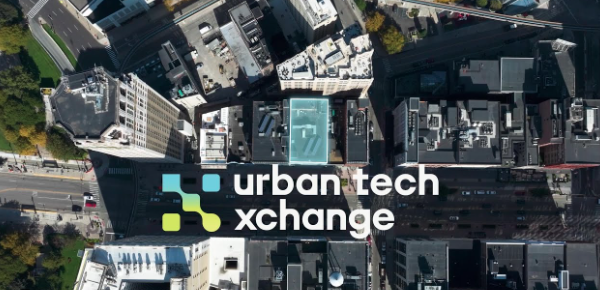
Nearly six months ago the Urban Tech Xchange (UTX) launched in Detroit – an innovative lab hosting a series of startups to advance smart city technologies. UTX is a collaboration between Bedrock, Bosch, Cisco, and KODE Labs and is operated by NextEnergy. The space provides a real-world test facility for the progression of sustainable urban solutions. Kevin Mull, senior director for the Office of Urban Strategy and Innovation at Bedrock, sat down with SBN Detroit to discuss the work being done there. Q: Impetus behind UTX? A: In 2021 Bedrock worked with Bosch, Ford, and the Michigan Economic Development Corp. (MEDC) to launch the Detroit Smart Parking Lab (DSPL) at our Assembly Parking Garage. This lab was specifically designed to accommodate open innovation, allowing startups to quickly and effectively deploy early-stage mobility technologies in a real-world testing environment. The concept has worked so well that we began to think about what’s next… being Detroit’s largest real estate developer, it made sense to try to apply those same methods to developing and deploying technologies for the built environment. The DSPL’s focus is mobility and transportation, which in many ways is dependent upon infrastructure, so the Urban Tech Xchange (UTX) was its natural progression. Q: In what ways does UTX help to foster a more resilient Southeast Michigan? A: I think it brings attention to the region’s entrepreneurial spirit and helps define Detroit as a place for innovation while adding another layer to its creator ecosystem. It also gives us a chance to further collaborate with stakeholders here in Southeast Michigan. Between the DSPL, TechTown, Michigan Central, Centrepolis Accelerator, and others like those, and our universities and colleges, and now UTX, we have an emerging set of platforms for continuing to attract and cultivate new ideas and advance open innovation throughout the state. Q: Why the combination of Bosch, Cisco, Bedrock and KODE Labs? A: Bosch and Bedrock are natural cofounders as they have complementary business concepts. Bosch is a lead innovator in energy and building management, while Bedrock is a city builder whose development projects throughout the central business district range from residential and commercial development to hospitality and retail. Cisco is a globally recognized brand and a huge player in smart infrastructure deployment, while KODE Labs is uniquely positioned as a Detroit-based startup focused on smart building technology that has recently experienced tremendous growth. The four companies together bring all the expertise for supporting a sustainable innovation platform, and importantly, maintain a strong Detroit presence. Q: How will Bedrock data be used to design sustainable solutions? A: This is the first-in-the-world kind of opportunity that’s driven by the uniquely dense portfolio we have in Detroit. We have this construct we are working on called a data lake, which is the aggregation of the data that comes from Bedrock’s 17 million square feet of real estate across Detroit. Its access to this unique operational data, combined with publicly accessible information like that from Census Data and the U.S. Energy Information Administration, provides lab participants with the unique opportunity to tie into a broad real estate ecosystem. We encourage and want anyone who engages with UTX to integrate their data as well, and under the right governance, we can offer this data lake to third-party developers for innovation. Q: In what ways are energy usage and decarbonization being looked at? A: Technologies like those being tested and deployed through the UTX platform allow us to track energy usage in real-time and better understand asset optimization. This provides us with the ability to cut back quickly and efficiently on carbon intensity. For example, heat pumps are a great technology but in certain situations, traditional heating systems might actually create less carbon. Real-world and real-time testing will help reveal this. The more data we get, the better decision-making we have and that can support AI applications as well. So first, it’s about understanding where a building is using energy, then understanding how the building responds to energy usage profiles. Q: Elaborate on how UTX is forming best practices for ensuring equity in urban tech solutions. A: When we set out to develop UTX we engaged several stakeholders such as community organizations, local government, public schools, and other platforms to all weigh in. Our work is fully transparent and there is a lot of communication in terms of where we are applying the technologies. For example, we are currently deploying tech in an area of Detroit to better understand air and noise pollution. We are working side-by-side with the community to make sure businesses and residents understand where we are doing this, how we are doing it, and in what ways the information will be used. Communication is paramount when trying to achieve equity in tech deployment. Q: In what ways does all of this work being done here impact businesses in Southeast Michigan? A: I look at it as a bidirectional flow. By establishing the UTX platform, we are helping to attract the best and brightest to deploy their innovations locally. Conversely, established local businesses have the opportunity to plug into a platform that provides a potential global spotlight. Q: What are some examples of new technology that’s being developed there? A: There are several examples of building automation systems, such as using smart blinds that automatically adjust to provide maximum natural sunlight based on occupancy and interior temperature. What I find very interesting are new systems for tracking and automating accessibility. One such deployment is smart communication between power wheelchairs and elevators. … The elevator is automatically called when the wheelchair arrives! Q: Do you think UTX is a differentiator for Detroit? A: Yes. Again, it puts Detroit on the map as a place that’s committed to, and capable of driving innovations and setting benchmarks and best practices for sustainable urban solutions. UTX is putting a stake in the ground for sustainable tech in an urban environment. Detroit is where the innovation is happening. Be sure to subscribe to our newsletter for regular updates
Global Green Energy and Metals Company Chooses Detroit for its First U.S. Advanced Manufacturing Center
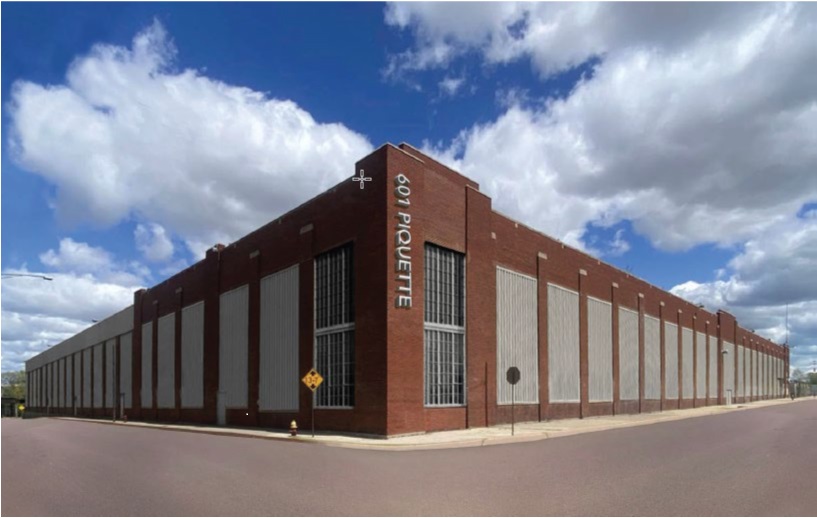
The former Fisher Body Plant on Piquette Avenue in Detroit has been chosen by Fortescue, a global green energy and metals company, as the location for its first U.S. Advanced Manufacturing Center. The facility will bring roughly 560 manufacturing and engineering jobs to the area focused on the production of automotive and heavy industry batteries, hydrogen generators, fast chargers, and electrolyzers. The project received incentives from The Michigan Strategic Fund, including a $9 million Michigan Business Development Program performance-based grant; a 15-year, 100% State Essential Services Assessment exemption valued at $1,300,950; and state tax capture valued at $2,374,413, for reimbursement of brownfield activities at the site. The project also is requesting $5,247,422 in tax-increment financing from the Michigan Department of Environment, Great Lakes, and Energy to assist with environmental-eligible activities. SBN Detroit interviewed Josh Hundt, MEDC’s Executive Vice President and Chief Project Marketing Advisor, about the role Fortescue will play in Michigan. Q: Fortescue chose Detroit Michigan for its first U.S. Advanced Manufacturing Center. What do you think this says about Southeast Michigan in terms of sustainability and manufacturing? A: It says that Michigan and Detroit are at the global epicenter of the mobility industry. Having put the world on wheels 120 years ago, Detroit is the birthplace of the automotive industry and it is also the industry’s future. This also clearly points to the fact that companies have a desire and need to be in Detroit for these types of opportunities. Q: Tell me about Fortescue. A: Fortescue is a global green energy company that plans to breed manufacturing practices and clean energy growth through its center here. Its goal is to be the number one green tech and metals company in the world. Q: What role did MEDC play in bringing Fortescue to Detroit? A: MEDC helps to grow companies already in the state while attracting new businesses to Michigan. Fortescue looked at 99 sites across twelve states, considering many variables such as labor cost, availability, cost of business, speed to come to market, and more. We’ve worked with them since they announced their decision to build in the U.S. to secure the right space for them in Michigan. Q: Fortescue’s CEO, Mark Hutchinson, said, “Fortescue’s Advanced Manufacturing Center will breathe fresh life into the birthplace of the automotive industry.” What are your thoughts on this? A: Michigan, Detroit, and the old Fisher Body Plant are all steeped in automotive heritage and legacy, and we can utilize that legacy of engineering, and research and development, and manufacturing to build the future of clean energy, advanced manufacturing, and mobility. This is an opportunity to move the industry, state, and community forward. Q: Why Detroit? A: Fortescue can leverage the 120 years of experience we have in Detroit to build a bridge to the future. Nearly three-quarters of U.S. automotive research and development takes place in Michigan. We lead the production of EV battery production. We have an existing supply chain and strong industry here. Fortescue also strongly considered ‘place.’ This community is in the midst of a transformation in terms of how investment is happening, and it’s a community of people who are skilled and educated to fill the roles the company will need. Q: How do you think Fortescue will impact other businesses in Southeast Michigan? A: Every time we see a company make an investment like this, it has a strong ripple effect on the industry, city, and region. This demonstrates that companies from around the world see Detroit as the future of mobility and advanced manufacturing. Fortescue will create 560 new jobs and is making a $210 million investment. This will help increase property values, and it’s an opportunity to develop the supply chain much further. This is great news for the industry and the community. Q: How do you think it will impact the economy? A: First it will create 560 jobs. Second, it furthers Michigan’s strength in the mobility sector while highlighting that we are the center for advanced manufacturing and clean energy. Third, this investment will also bring new tax revenue and new opportunities for suppliers to have growth occur here in Detroit. And finally, their presence will impact restaurants and venues in and around the community for additional growth. Q: What role do you think Fortescue will play when it comes to sustainability in Southeast Michigan? A: I think the biggest thing is the role they play in showing leadership – demonstrating that a company can have a great economic impact with job creation and investment and do it in a way that also puts sustainability and the environment at the forefront. And, their choice to renovate and utilize the old Fisher Body Plant speaks volumes because it shows that a facility can be reimagined and transformed for the future. This is an investment in a century-old building being leveraged to take us forward. Q: What does the future of Southeast Michigan look like with Fortescue as a part of it? A: Fortescue will be part of a strong mobility landscape and a part of the overall story of how Southeast Michigan is positioned to remain the global leader of the mobility industry. We’ve seen the success of projects around innovation and investments – like Nel and Plastic Omnium – that have positively impacted Southeast Michigan. This is a project that will put people in sustainable jobs, revitalize the area, boost the economy, and facilitate green energy for the future. It is a win for everyone. Be sure to subscribe to our newsletter for regular updates on sustainable business practices in and around Detroit.
Resiliency Hubs, Waging a War on Trash, and Increasing African American Home Ownership
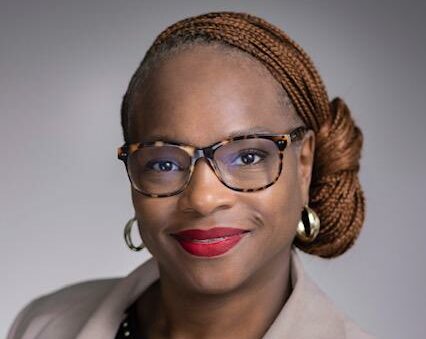
In 2022, Monique Baker McCormick was re-elected for her third term as Wayne County Commissioner of District 6. She serves Redford Township and Northwest Detroit in the community where she grew up. SBN Detroit spoke to McCormick about the sustainability initiatives she’s been involved in and how they impact residents and businesses in her community. Q: How does sustainability integrate with your position and the work you do as a Wayne County Commissioner? A: I think elected officials must support our communities and in doing so we need to protect the environment and quality of life for today and for future generations. Q: You are involved in so many committees and initiatives, can you give a couple of examples of how sustainability comes into play? A: We recently received a $1.1 million grant to create Wayne County resiliency hubs to reduce our carbon footprint in Wayne County. When I became the chair of Health and Human Services, I became involved with the toxic waste coming from Ohio to Wayne County following a train derailment. This is an environmental issue, a human rights issue, and a civil rights issue, and impacts the quality of life for all of us. As a commissioner, I don’t dig into how cities manage their environmental programs, but I can help on a county level to get funds and to help with programming necessary for the communities. Within the Economic Development Committee, we do have more say in how the operation of sustainability of Wayne County unfolds and how the resiliency hubs work as well. Q: How does this work impact businesses in your district? A: I think the work we do to reduce our carbon footprint and improve the quality of life in Wayne County impacts all of our citizens and businesses and will only help them grow and flourish. I think it helps to drive new businesses to the county as well. Q: You created the Wayne County Commission Youth Council (WCCYC). What is the impetus behind this? A: I had a long journey to becoming a commissioner. I started as a young Democrat and worked for the Democratic party and began to see first-hand how our democracy works and also how it does not. I want the next generation of leaders to understand that if you don’t fight for something, have a voice, or don’t have a seat at the table then don’t expect that someone is going to fight for you. If you want to see change in your community change starts from the bottom up, and that means all of us getting involved in the process. The Wayne County Commission Youth Council helps young people understand this and empowers them to get involved in the process. The goal is to take youth from varied socioeconomic backgrounds and multicultural neighborhoods and help them become socially responsible community members. They pick their topics. We have worked on gun reform, mental health in schools, economic oppression, and more. They do voter registration and outreach, community service, and other issues. We travel to Lansing to meet legislators to make their voices heard regarding what they want to see change in Wayne County. Q: Do you think the youth that are involved now will have an impact on Southeast Michigan businesses as they join the workforce? A: One girl comes to mind – a tenth grader who was an introvert who did not want to speak in meetings at first. She didn’t know she had a voice. She evolved and eventually became the Youth Council President, speaking at all of the meetings and doing interviews, etc. Now she knows she can use her voice for change and for good. Another former member is now the president of his college council on campus. The program also has an internship component. One of our members worked for the mayor’s office in Northville. They go on to do the work that we start. Q: You have led efforts to mitigate foreclosures and increase African-American homeownership. How does this tie to sustainability regarding developing communities and the economy? A: The sustainability of Black and Brown communities starts with the American dream of home ownership. With home ownership you build equity. You buy a home and the value increases over time and once that increases you have this equity. But we’ve seen generations of wealth that have started with home ownership to then be wiped out by freeways. This causes generational economic oppression. It’s difficult to sustain a quality of life when you are always starting behind. Since 2008, African American home ownership is back down to the levels it was in the late ‘60s and early ‘70s all over the country. Detroit has more renters now whereas years ago there were more homeowners. We have to be intentional about how we address this. There are still redlining issues. There is still a lack of ability to get loans. There are a lot of issues around trying to get back to where were. Q: What is the war on trash that you initiated? A: This is an anti-littering campaign. It’s about advocacy that pushes the government and the community to do the right things around trash and littering. When we started the campaign, one of the first issues to address was to ensure our community had trash cans. I worked with the city of Detroit and the Downtown Detroit Partnership to purchase 50 trash cans and enlisted community volunteers to put the cans at city entry points, bus stops, etc. We partnered with elementary schools to try to embed early on that if you live in a community, you should be proud of that community and help to keep it clean. Our messages of “Love Where You Live” and “Don’t Stop and Drop” prompted kids to create art projects around clean communities, maintained trash around their schools, and more. It’s pushing to keep communities clean and green because there is more trash, there is more crime. Q: How do you think
Implementing Sustainability Initiatives is Crucial in Today’s Business World
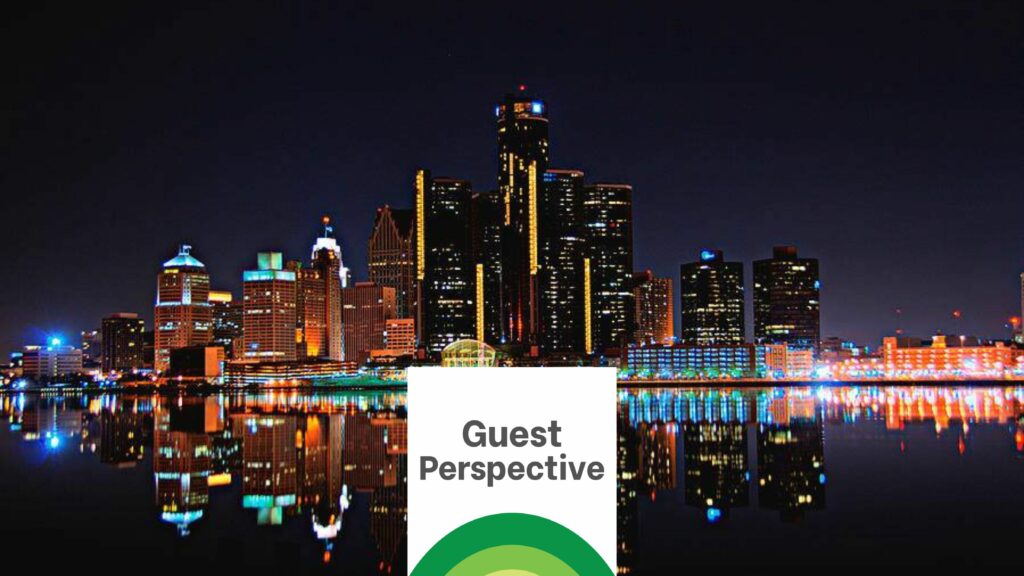
CONNIE LILLEY IS THE EXECUTIVE DIRECTOR OF DETROIT 2030 DISTRICT You may be missing out on growth opportunities if you’re a business that has yet to jump on the sustainability train. I’m sure you’ve heard the word “sustainability” before, but what exactly does that mean to your business? That’s the question all individual companies need to ask. PEOPLE, PLANET, AND PROFIT The well-known triple-bottom-line theory is just one of many theories floating around today. But, the most basic question that all businesses need to ask is: How is my company benefiting People, Planet, and Profit? No matter what program, theory, or process a business intends to follow, there’s one sure thing – getting started can be the hardest part. But, if you are a company that is just getting started, it’s easier than ever to create a sustainability plan for a business. Companies no longer have to reinvent the wheel when writing a sustainability plan. Other businesses have created many programs and published sustainability plans to help lead the way and share best practices. While sustainability means different things to different organizations, there’s no denying that implementing sustainability initiatives can help a company’s growth in more ways than just environmental stewardship. While that is the main focus of sustainability, let’s not forget about the economic benefits as well. A company that reduces utility costs can put that savings into hiring more employees, spurring economic development. Sustainability plans should be a part of any business operational plans. Here are some of the benefits of getting started. SAVE MONEY ● Reduce the cost of transportation to and from landfills ● Reduce your operating expenses when you use less energy and water ● Reduce your stormwater runoff fees Reduce your company’s carbon footprint ● Lowering greenhouse gas emissions by reducing energy and water consumption ● Installing gardens or green roofs to manage stormwater runoff ● Reduce transportation emissions to and from landfills and local traffic Increase your revenue: ● Increase positive public relations and marketing by promoting your company’s sustainability efforts ● Increase sales by offering sustainable products to your customers ● Create a healthy building to attract quality tenants to increase rent ● Provide a healthy environment for employees and thereby reduce sick days The steps described above are not always easy to implement. If you own or manage a building, creating a high-performance building takes focus and commitment. Organizations such as 2030 Districts are forming across North America to assist facility managers and owners with tasks such as tracking and managing water and energy consumption, offering educational opportunities, sharing best practices, and more. Most 2030 District programs are free or cost-effective compared to hiring a consultant or company to assist. For more information and to find a 2030 District in your city, visit www.2030districts.org. Be sure to subscribe to our newsletter for regular updates on sustainable business practices in and around Detroit.
MGM Grand Casino: Systems, Recycling, and Goals Are Key to Sustainability Efforts
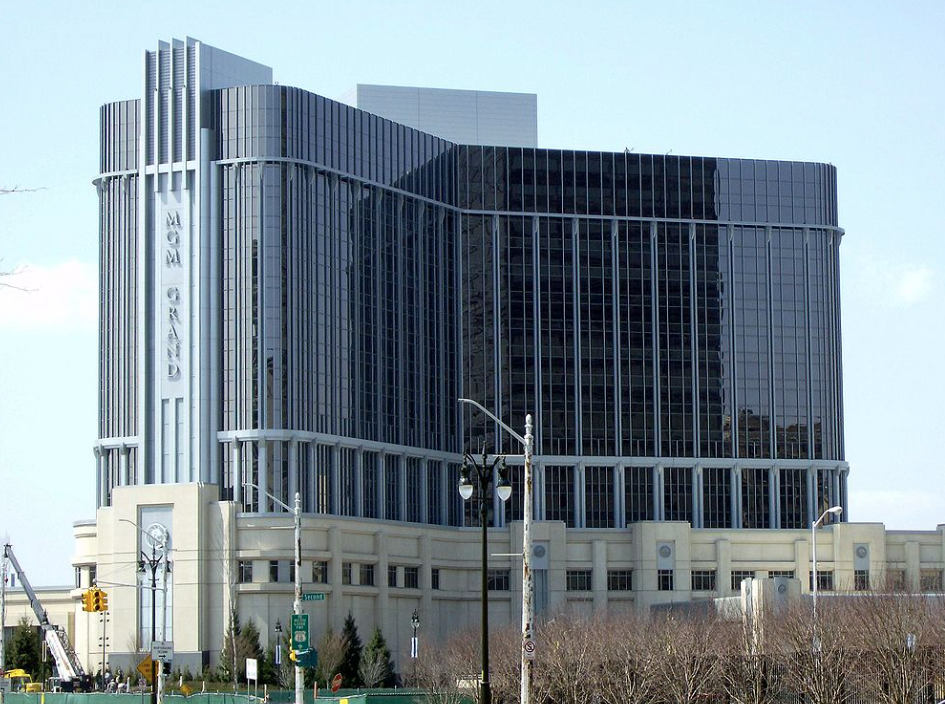
MGM Grand Detroit is one of three casino resort hotels in Detroit and one of four in the Detroit–Windsor area. It is owned by Vici Properties and operated by MGM Resorts International. The hotel opened in 2007. SBN Detroit interviewed Jay Love, vice president of facilities, and Carlton Dennard, director of environmental science and housekeeping, about sustainability planning and efforts in facilities and maintenance. Love said he is responsible for “anything that moves water or air within the facility.” He oversees general maintenance and works to improve processes and services for guests, as well as contributing to the maintenance strategy to extend the life of equipment and assets within the casino and hotel. Denard has been with MGM Grand Detroit since it opened and oversees a team of 250. He is responsible for the game floor and front and back of the house and the cleanliness of 400 guest rooms. Q: What type of sustainability planning does MGM Grand Detroit do? Dennard: In my role – among other things – we are heavily focused on recycling and it’s been a big commitment since day one in 2007. The goals that corporate institutes continually evolve, and we follow their lead. Love: Our corporate leadership team in Las Vegas rolls out a plan for every property each year. We pursue sustainability efforts in line with that. We’re committed to sustainability and reducing our environmental impact, while also contributing to economic growth in the region. Q: What are some of your current initiatives and goals in sustainability? Dennard: We are working on surpassing our annual recycling numbers. Last year we recycled 280k pounds and we are looking to continually increase these recycling efforts. When it comes to energy, our goal is to convert to 100% renewable energy by 2030. One example of work there is replacing all lights with LED bulbs. When it comes to housekeeping, we use environmentally friendly chemicals and cleaners. Ecolab supplies the resorts with chemicals daily. We also have a Green Advantage Program. If guests are staying for more than two nights, they can opt to reuse towels to decrease the waste involved in replacing towels. Love: The facilities department is working to reduce electrical consumption by 2.5% this year. This is done by adjusting set points to ensure units are not running as long or as hard, installing occupancy sensors, and making sure our mechanical equipment runs efficiently. So, we are really focusing on chillers, chilled water setpoints, boilers, boiler setpoints, heat exchangers, and that type of equipment. We’ve done a lot of preventive maintenance to ensure that the equipment operates as efficiently as possible. Longer-term goals are to reduce carbon emissions per square foot by 45%, and water by 33%. Toward these goals – and others – we have best practices laid out by our corporate office. Q: What are your biggest challenges? Dennard: It’s critical to remain proactive instead of reactive and with a facility of this size, that can be challenging. Love: Staying in front of reactive repairs to minimize the impact on the operation is key. If a boiler goes down, we need to have a redundancy in place, so we are ready to roll right away. And from a sustainability standpoint again, maintenance and ensuring efficiencies are key. Q: How does sustainability come into play when choosing vendors and partners? Dennard: There is a bid process used when selecting vendors and sustainability plays a large factor in our decisions. Love: It weighs heavily in all of our decisions. We go through a strict and thorough process with the purchasing department to approve all vendors. Also, to ensure all equipment purchased is up to spec and within sustainability guidelines. We will always consider bringing on new and local vendors to continue to diversify and support the economy. Q: How do you think your sustainability work impacts the businesses and communities around you? Dennard: Going back to recycling as one example on my end – MGM is responsible for 17% of recycling in the city of Detroit. I’m proud of that number and looking to grow it. We are working toward collaborating with other casinos in the city to that end. That has a significant impact on the community around us and the city of Detroit. Love: I think there is a huge impact. Any time we roll out a new initiative we try to use local businesses and minority-owned businesses to help the local economy and also to set an example. I think there is a domino effect. I think our commitment to sustainability demonstrates that economic growth and environmental responsibility can coexist, creating a better future for everyone. More about MGM Detroit’s environmental efforts can be found here Be sure to subscribe to our newsletter for regular updates on sustainable business practices in and around Detroit.
Small Business Role in Sustainability is Largely Untapped
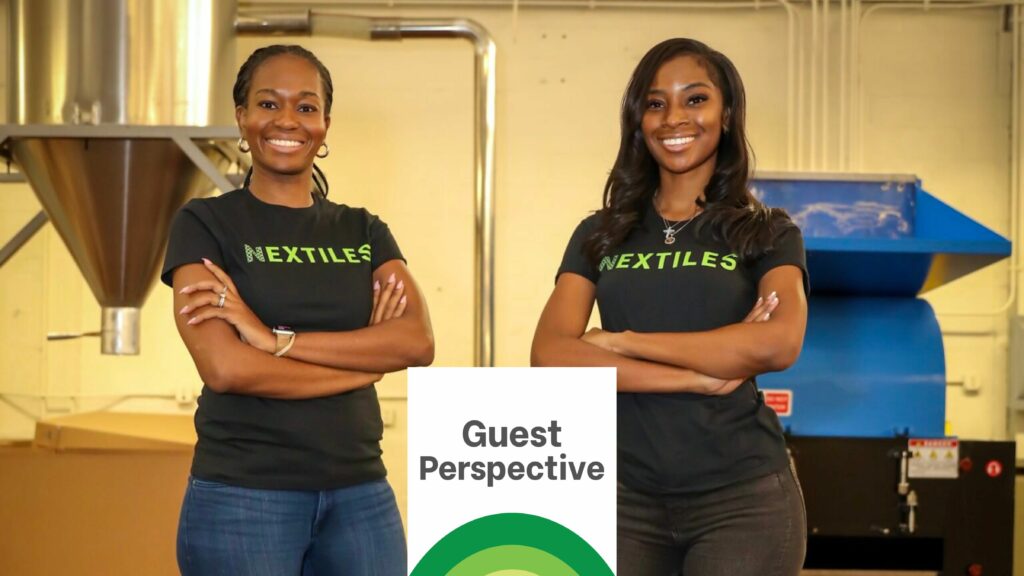
WAFA DINARO, EXECUTIVE DIRECTOR, OF THE NEW ECONOMY INITIATIVE, AND A LEADERSHIP COMMITTEE MEMBER FOR SUSTAINABLE BUSINESS NETWORK DETROIT During an internship with a recycler in New York in 2020, entrepreneur and environmental scientist Madeline Miller watched as the waste materials from textile companies were being processed in the facility, and something entrepreneurial clicked. In the “waste,” she saw home-building insulation that could be reused back home in Michigan while increasing energy efficiency in Detroit homes. From there, NexTiles was born, a Detroit-based textile recycling company that produces EcoBlow – a nontoxic, eco-friendly building insulation made entirely of recycled pre-consumer fabric from manufacturers, particularly automotive interior suppliers, and fashion designers. While her experience reflects the role small businesses can play directly in terms of creating eco-conscious products, every small business, no matter their product or service, can implement eco-friendly business practices. Unfortunately, many of the same challenges that prevent small businesses from thriving in general – limited access to capital and lending; a lack of technical assistance in finances, marketing, and business planning; and the inability to tap into a business support network for grants and resources – will prevent them from reaching their full potential in sustainability. Yet, nearly all the factors that help small businesses drive economic resilience position them to be a transformative force in sustainability. SMALL BUSINESS DRIVES SUSTAINABLE ECONOMIC RESILIENCE First, there are the sheer numbers. There are 33.2 million small businesses in the U.S. accounting for 99.9% of all businesses. They make up our largest employer group and accounted for almost two-thirds – or 17.3 million – of all jobs created from 1995 to 2021, according to the Small Business Administration. And they continue to grow, in 2022, there were more than 5.1 million new business applications filed. Second, small businesses are nimble and can move quickly to drive innovation. They are fueled by their founders’ ideas and life experiences and are often created to provide solutions to real-world problems impacting friends, families, or communities. Third, small businesses are invested in the social fabric of their communities and exist all around us, giving them nearly universal reach. They have a vested interest in their neighborhoods thriving that stretches well beyond business and adds further incentive for them to succeed. At the New Economy Initiative, we’ve spent the past two decades building a support ecosystem that helps entrepreneurs, startups, and small businesses build a more resilient economy within their own communities and Southeast Michigan. In the case of NexTiles, we provide funding to the Centrepolis Accelerator at Lawrence Tech University, which has played an integral role in NexTiles’ product development and growth. It is why we support similar nonprofit and locally grounded organizations that provide technical assistance, lending, and connections to small businesses throughout Southeast Michigan. Sustainability is the next logical step in expanding our mission. That is why the New Economy Initiative is pursuing a sustainability program to integrate with our traditional business support activities. NEI SUSTAINABILITY PROGRAM GOALS That program can accomplish a few major goals that will help small business play its role in sustainability by mirroring much of what we already do. It would include raising awareness about the bottom-line business benefits of sustainability that can be achieved through energy efficiency. It can help businesses identify how to integrate sustainable practices into their business plans that reduce waste while increasing efficiency and profits. It can help them access resources and grants available to increase sustainability. Chief sustainability officer is one more a hat small business owners are asked to wear – we need to provide a small business ecosystem that empowers them to fulfill it. Until we do, the collective power of our largest employer group to create a world that lasts for future generations is largely going untapped. Source for data: https://www.uschamber.com/small-business/state-of-small-business-now Be sure to subscribe to our newsletter for regular updates on sustainable business practices in and around Detroit.
Smart and Unique Sustainability Start-Ups are Making an Impact in Southeast Michigan
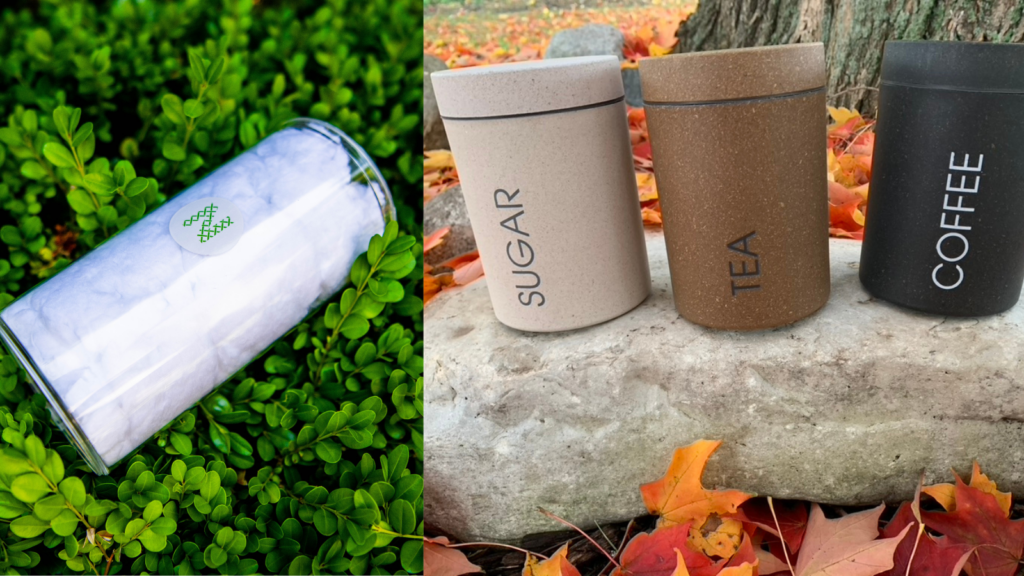
A hardworking number of Southeast Michigan manufacturing companies and hardware entrepreneurs are getting their start at the Centrepolis Accelerator, a nonprofit business facilitator providing access to key resources, a collaborative community, product development, and manufacturing experts with an impetus to keep manufacturing in Michigan. Launched in 2017 by Lawrence Tech, the City of Southfield, and the Michigan Economic Development Corp. (MEDC), the accelerator focuses largely on the areas of climatech, cleantech, and the circular economy. SBN Detroit spoke with two woman-owned sustainability businesses working with Centrepolis to gain insights on the whys and the hows regarding their industry choice, go-to-market objective, and their start-up paths and challenges. NexTiles, a Black-, woman-owned Detroit-based textile recycling, and secondary use company uses textile waste from Detroit’s automotive and apparel manufacturing industries to make eco-friendly building insulation that can reenter the circular economy at the end of its life. The founder and CEO is Madeline Miller. Pivot Materials is a millennial-woman-owned Detroit-based social impact business that specializes in providing sustainable biomaterials by upcycling agricultural waste, including bamboo fibers and rice and coffee hulls. The co-founder and CEO is Kylee Guenther. Q: How did the concept of your business come about? Miller: I was at the University of Miami doing my graduate studies in marine and atmospheric science. My undergrad was in environmental science, and I didn’t know exactly what I wanted to do with my education, but I started studying ocean plastics and then landfill waste and developed an understanding of manufacturing overconsumption and the waste it creates. I then started an internship with a New York-based textile recycling company and began brainstorming secondary uses for this textile waste. I came up with the insulation concept and it stuck. I’ve now been able to combine my Ph.D. research at the University of Michigan School for Environment and Sustainability around the energy burden with the corresponding demand for insulation. It’s been an awesome fit and direction for me. Guenther: My co-founder Raju Patil and I combined our childhood experiences into the mission of our business, Pivot Materials. I’m the second generation in my family to work in Michigan’s plastics industry. I grew up on the shop floor learning about plastics from the bottom up. I’m so proud of my dad and his career, which spanned about four decades in the plastics industry, but even as a kid I was mortified by the amount of waste he helped create. Raju grew up the son of a rice farmer in rural India and had similar feelings about the waste created by the agricultural industry. One-third of all black carbon emissions globally are created by crop burning. We thought we could work on both issues together so we started using agricultural waste to reduce plastic usage while also reducing the amount of agricultural waste that gets burned or sent to landfill. Q: Why sustainability? Miller: Textile waste consumption needs to be slowed drastically and the overwhelming amount of manufacturing waste in the atmosphere needs to be addressed. Our natural resources are being impacted and people are being impacted. They will continue to suffer if we don’t slow down. I want to change lives for Detroiters by using locally manufactured building insulation to create clean jobs, decrease the utility burden on families, increase diversity in the energy industry, divert textile waste from landfills, and contribute to the growth of the circular economy. Guenther: I often repeat in my head “be the change you want to see in this world,” and that’s driven my passion for sustainability. I think it’s absurd that only about 9% of all plastics created get recycled. I also know that plastics aren’t going anywhere. They’re too embedded in our lifestyles and plastic makes a lot of money for a lot of people. So, my passion is to transition away from as much plastic usage as well as other non-sustainable materials while also helping reduce the environmental impact of agricultural waste. Q: Please walk us through your start-up process and your work with Centrepolis. Miller: When I transitioned from Miami to Detroit and had the idea to start the business, I began working with TechTown Detroit. They familiarized me with customer discovery process and helped me to identify challenges and opportunities for my business. Centrepolis has been extremely helpful in the product development process. After we got over the hump of exactly what we wanted to make, Centrepolis came in and helped me identify a plethora of resources, including warehouse space, equipment, product treatment packaging, and marketing. Guenther: I’m really happy to see that Dan Radomski, executive director of Centrepolis started an accelerator specifically for product-based companies. This has been missing in the ecosystem. For us, I think the biggest benefit from Centrepolis has been working with our mentor and Expert-in-Residence, Richard Broo. Richard is a plastics industry veteran with about 40 years of experience in material sciences and project management. Sometimes we have an issue that we think is huge, and he can solve our problem in about two seconds and reassure us that it’s no big deal. This helps us save a lot of time as we grow our business, and it gives us someone to learn on. Q: Are you focused on business-to-business or business-to-consumer? Miller: I work with both. The first part of my business is waste collection and recycling. Here I focus on the automotive and textile industries, so this is B2B. A portion of that waste is then upcycled into eco-friendly insulation, a product I ultimately plan to sell to consumers. Guenther: We’re B2B. We sell our materials to brand owners and manufacturers who already use plastics or are looking to create a greener new product. Q: What are your biggest challenges? Miller: Communicating the value of our business to manufacturers is one of our biggest challenges. There is so much volume when it comes to waste, and it’s cheaper to take it to a landfill than to collect and process it into a new product. Some companies are at the
College for Creative Studies Launches Graduate Program Toward Developing Leaders in Climate Action
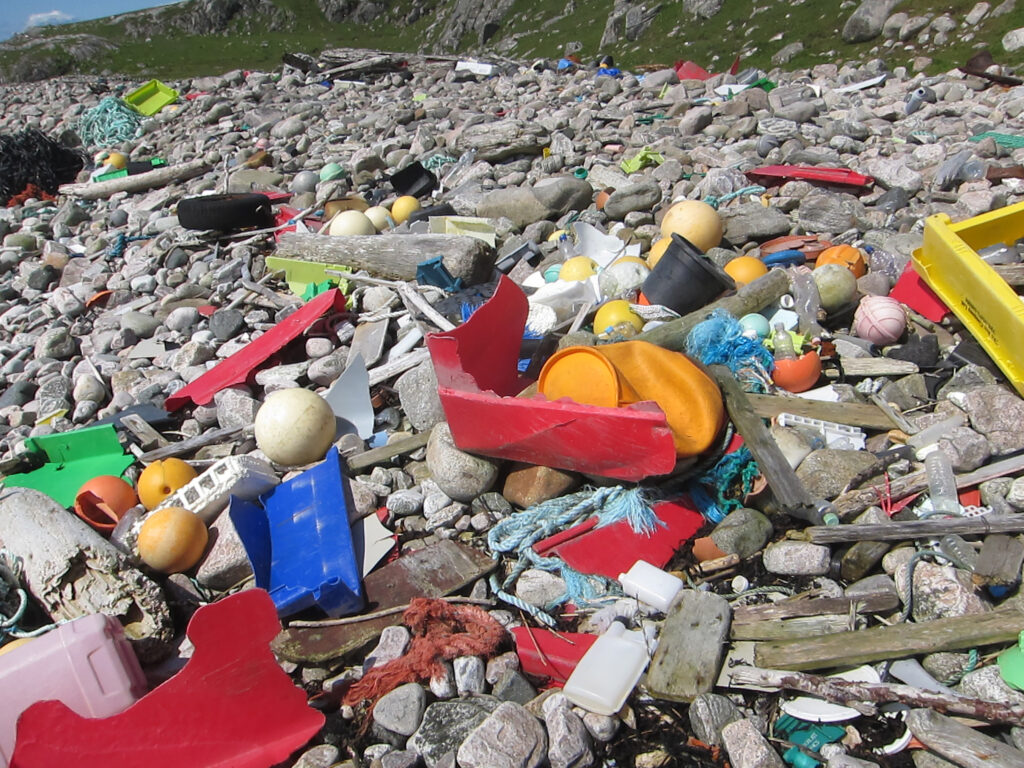
In the fall of 2023, the College for Creative Studies will launch Design for Climate Action – a new graduate program aimed at tackling the global climate action and change emergency from multiple angles. The program invites applications from designers and non-designers of all kinds, bringing together broad multidisciplinary mindsets for interdisciplinary collaboration. It will foster an understanding of zero-waste materials and processes, circular economies, civic infrastructures, and environmental stewardship. At its heart is the drive to bring about change in existing systems and transition to structures that reverse global heating and uphold climate justice and global equity. Leading the program is Dr. Ian Lambert, Dean of Graduate Studies & Research. Lambert is a designer and maker-researcher with extensive experience in academic leadership and curriculum development in higher education in the U.K., the U.S., and China. Lambert has taught sustainable design for more than 20 years and his work with ocean plastic in Scotland along with other waste streams is widely published. He has brought his work with ocean plastic to the Great Lakes and recently joined the Detroit River Coalition. For the last two years, he has been collaborating with the Charles H. Wright Museum of African American History on the d.Tree Studio – diverting dying trees from landfills to become narrative artifacts that elevate climate justice. He is a Fellow of the Royal Society of Arts, and a former advisor to the Creative Conscience Awards. SBN Detroit spoke to Lambert about the program. Q: What is the impetus behind the new Design for Climate Action Master’s Program? A: In addition to further embedding sustainability across the CCS curriculum, we are looking to highly specialize in addressing the climate crisis. This is about working toward and educating about systemic change. There are many perspectives required in tackling climate action, so the program is about foregrounding design thinking at the intersection of multiple disciplines. The program welcomes scientists, engineers, philosophers, and sociologists as well as designers and other creatives. It is the synergy formed by these different skill sets that can drive change in the climate crisis. It’s important to remember that while science presents the facts and explains what is happening, the climate crisis is a cultural crisis, a social crisis, an economic crisis, and a political crisis. It affects humankind in many different ways and it’s not just for scientists to solve. The program takes the position of stating climate problems calmly and rationally. We need to use intelligent and persuasive narratives to bring others, including business leaders and politicians, with us. The debate is often highly polarized, which is dangerous. So, it is important to temper our outrage and avoid alienating those across the divide. Q: What does it mean for CCS to offer this program? Is this kind of curriculum unique to design school offerings? A: The program is focused on action in the climate crisis and systemic change. I don’t know of any other program that takes such a multidisciplinary approach with design at its hub. Also, our grad program is growing, and part of our strategy is to consider where the needs are and identify opportunities for aligning with the activity that’s happening in Detroit. Essentially the program has three pillars that overlap and blend: The circular economy and closed-loop manufacturing and material cycles. Systems and infrastructures – How we can redesign these or make interventions and design out waste? Environmental stewardship and understanding the lasting effects of human production on our environment Q: What implications might this have for the Detroit businesses – graduates with this skill set and education coming into the workforce? A: A recent report in the Atlantic stated that the government will be spending $374 billion on fighting climate change, and some are estimating it will reach $800 billion. This will require experts of all kinds to implement and lead change within businesses, corporations, and public organizations. Experts who can galvanize collaboration and take action in multiple ways. The demand for climate design experts is only going to grow, and our graduates will go into the world with not only the expertise but the passion and capability to apply a persuasive narrative to bring about these changes. Q: Can you tell us more about bringing together broad multidisciplinary mindsets for interdisciplinary collaboration? A: At the graduate level all design programs operate at disciplinary intersections. The climate change crisis is omnipotent, and the key to this (working to solve it) is being capable of working with other areas of expertise. This is not a crisis to be dealt with by lone crusaders. It truly requires collaboration that is deep and expansive. So it’s really important to develop students into leaders who can advance this approach. When it comes to leadership, there is this concept of the T-shaped individual, where the vertical bar on the letter T represents the depth of related skills and expertise in a single field, and the horizontal bar is the ability to collaborate across disciplines with experts in other areas and to apply knowledge in areas of expertise other than one’s own. And then there are X-shaped individuals, with “executive” skills and deep expertise in a core knowledge area as well as strong leadership skills and credibility. We need both T-shaped and X-shaped skill sets to approach and address the climate crisis, and our program will work toward building these. Q: Will the students be involved in sustainability programs and projects in Detroit? A: CCS has an extensive and well-established set of partnerships and connections with industry and our students work on many sponsored and live projects. Currently, students are working with Consumers Energy to help implement EV charging services from a user experience perspective. Last year, our students worked with the Charles H. Wright Museum of African American History on redirecting dying trees from landfill to narrative objects. Our students have worked on clean air projects, food waste diversion, water security, sustainable tourism, and green mobility systems, to name a few. I’m also very proud of the CCS Color and Materials Design Students who
Kerry C. Duggan Works With Game-Changing Sustainability Businesses in Detroit

SBND interviews Kerry C. Duggan,national political advisor and visionary climatech executive and former Obama White House official. Founder and CEO of SustainabiliD in Detroit, and recently named the founding director of the University of Michigan’s SEAS Sustainability Clinic, Duggan shares her thoughts on a local level, highlighting key women and businesses who are making an impact and offering advice on approaching sustainability. Duggan is a board director of Perma-Fix (NASDAQ: PESI) and a senior advisor at RockCreek. She also sits on several corporate advisory boards, including Our Next Energy (ONE), Lux-Wall, Aclima, Walker-Miller, Arctaris Impact Investors, BlueConduit, and Commonweal Ventures. She is a senior fellow at the Federation of American Scientists and a member of the International Women’s Forum. Duggan’s current public service includes serving as an appointee to the (U.S.) Secretary of Energy’s Advisory Board (SEAB) under Secretary Jennifer Granholm and to the State of Michigan’s Council on Climate Solutions under Gov. Gretchen Whitmer. Q: Kerry, please tell us about your current work. A: I started SustainabiliD five years ago. It is a woman-owned,service-disabled veteran-owned, Detroit-based diverse small business working with game-changers to equitably solve the climate crisis.So, I have no small mission statement. As such, I’ve spent the last five years working on climate solutions in two ways: On the institutional side, I’m working to help develop the business model around place-based work for larger organizations. I have been appointed as the founding director of UM’s SEAS sustainability clinic in Detroit, and we are currently focused on three goals: To seek equitable and just solutions to the city’s most pressing sustainability-related issues; to lower operating costs—particularly in energy management for city operations—while reducing carbon emissions; and to support the delivery of services directly to the city and, through partner programs, to improve residents’ quality of life. Second, I work with climate solution companies. These are the game-changers. For example, Our Next Energy (ONE) recently set a world record of EV miles traveled on a single charge: 752 miles, in December, in Michigan. This is a very big deal. I work to help these businesses navigate opportunities to scale with the speed that we all need to combat the climate crisis. Q: Your work is largely around energy, climate, and environment.Where does your passion in these areas come from? A: First, I’m a mom. Climate is the most urgent issue of our time, and I want to create a safer, more sustainable planet for the next generation. Second, I have always loved doing my work in Detroit. My ancestors immigrated to Detroit from Ireland, so from a generational perspective, I try to give back to the place that has given my family so much. In this way, I’m very grounded in Detroit. I was also blessed to spend many summers of my youth on the shores of the Great Lakes, home to 21% of the world’s fresh surface water. How lucky are we? I work to protect that and make it available for my kids. Lastly, I have a basketball background, and the skills I gleaned from playing high-level hoops have transferred to my work. I’ll give an example. There is a move in basketball called the ‘give-and-go move’ where you give the ball away, then cut to the net, and get the ball back to make the lay-up. In my work, I listen to the needs of leaders in communities, putting aside my point of view, because if I don’t listen to real and immediate needs, we are just talking past one another – and no one wins. I put the give-and-go into practice in this way a lot. Q: What is your vision behind SustainabiliD? A: I grew up in a suburb of Detroit. Kids twenty miles down the road living in the city of Detroit faced injustices that I did notand conversely did not have the opportunities I had. That’s been my charge: how can we change this and ensure the city is not only vibrant and safe but also offers equitable opportunities to everyone? Q: The SustainabiliD team is predominantly women. What are your thoughts on women as leaders in sustainability? A: I think if I created a pie chart of my calendar, we’d see that daily I’m mostly speaking with female leaders across the globe, who are mostly non-white. These are the voices that have been left furthest behind in every conversation to date on the planet. I know I don’t have all the answers, but I always try to listen to people of color, women, other minorities, and people with underrepresented identities on what their needs are and try to help them position themselves to win the future. That’s where I’ve chosen to spend my time. Q: Speaking of women, what Detroit female business leaders in the sustainability space can you point to who are making a difference? A: Carla Walker-Miller. I work with a variety of companies but one that is an absolute stand-out is Walker-Miller Energy Services. In addition to what they do, which is to help relieve folks of energy burden by doing energy retrofits, Carla is an equitable economic development leader and a woman of color. I admire her not only for her company’s work but for her leadership. She is a national figure living and working in Detroit making a great impact on equitable economic development. Her work constantly informs what I’m doing now. Carla Walker-Miller has hired Dr. Brandy Brown as Chief Innovation Officer for Walker-Miller. She is another amazing talent. Before joining Walker-Miller, Dr. Brown served as Climate & Energy Advisor within the Michigan Department of Environment, Great Lakes & Energy. She also serves as part of the Environmental Justice faculty for the University of Michigan’s School for Environment and Sustainability and as an appointee to Michigan’s National Resources Trust Fund Board. A native Detroiter, Dr. Jalonne L. White-Newsome was recently tapped to be the new White House Council on Environmental Quality’s Senior Director for Environmental Justice. She has tackled environmental challenges from a wide range


